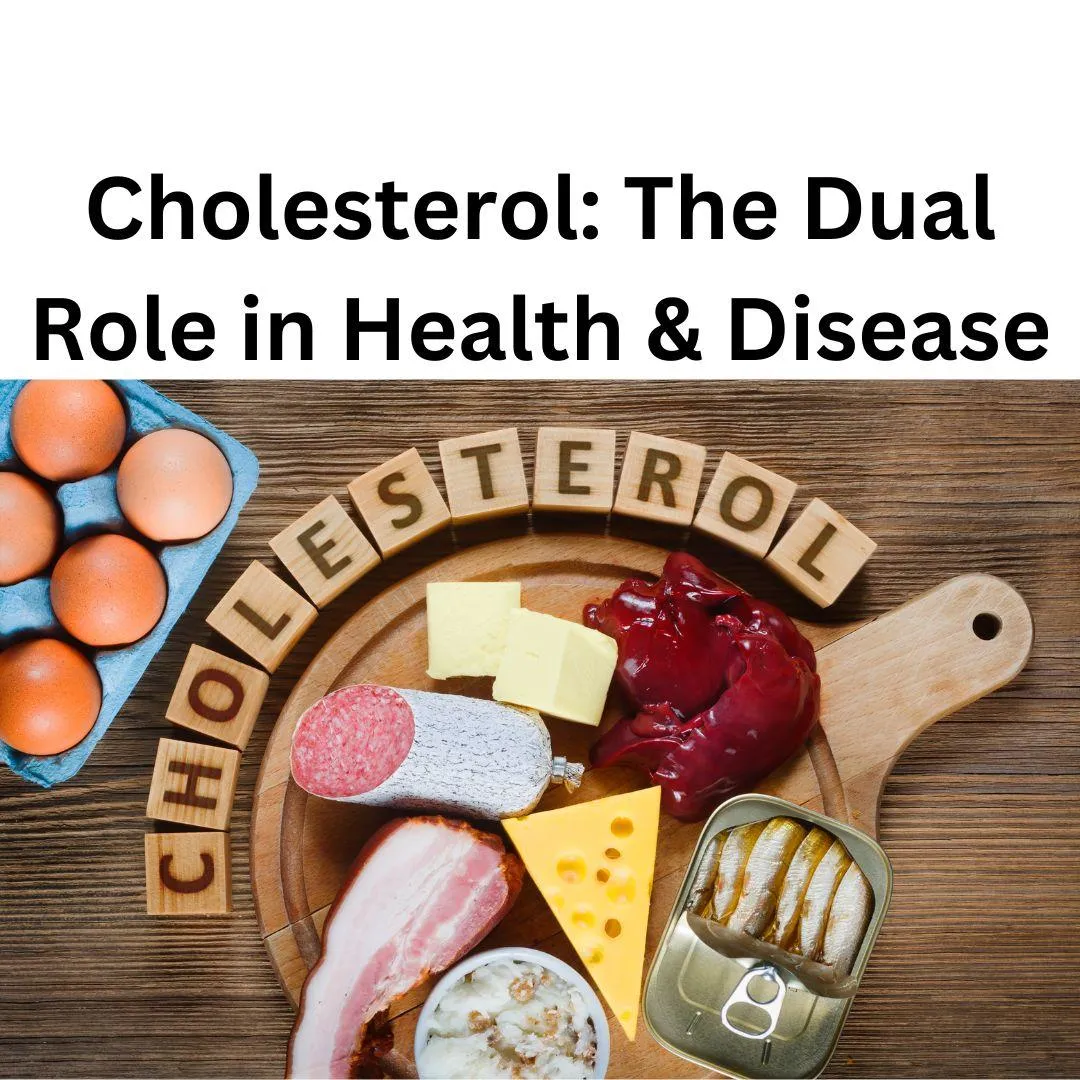*Open to Florida Residents
Blog
Blog

Cholesterol: The Dual Role in Health and Disease
Cholesterol is a waxy, fat-like substance found in every cell of the body. While it often garners a bad reputation, cholesterol plays a crucial role in maintaining overall health. This blog explores the benefits of cholesterol, the potential concerns of lowering it excessively, how it is measured, when statins are appropriate, the side effects of these medications, and alternative herbal remedies that may offer fewer side effects.
The Role of Cholesterol in the Body
Cholesterol is vital for several physiological processes:
Hormone Production: cholesterol is the building block for steroid hormones, including:
Testosterone: Essential for the development of male reproductive tissues, muscle mass, bone density, and the maintenance of libido in both men and women.
Estrogen: Plays a critical role in regulating the female reproductive system, bone health, and cardiovascular function.
Cortisol: Known as the “stress hormone” it helps the body respond to stress, regulating metabolism, and control inflammation.
Progesterone: Vital for preparing the body for pregnancy and maintaining the uterine lining during pregnancy.
Aldosterone: Regulates blood pressure by controlling sodium and potassium levels in the body.
Vitamin D Synthesis: cholesterol is indispensable to produce vitamin D. When the skin is exposed to sunlight, specifically ultraviolet B (UVB) rays, a form of cholesterol called 7- dehydrocholesterol undergoes a chemical reaction to form vitamin D3 (cholecalciferol). This active form of vitamin D plays a critical role in:
Bone Health: By promoting calcium and phosphorus absorption in the intestines, vitamin D ensures the development and maintenance of strong bones and teeth, reducing the risk of conditions like osteoporosis.
Immune Function: Vitamin D modulates the immune system, enhancing the body’s ability to fight infections and reducing the risk of autoimmune disorders.
Mood Regulation: Adequate Vitamin D modulates the immune system, enhancing the body’s ability to fight infections and reducing the risk of autoimmune disorders.
Cardiovascular Health: Research suggests Vitamin D supports heart function and may reduce inflammation in blood vessels.
Cell Membrane Integrity: Cholesterol ensures the structural integrity and fluidity of cell membranes, enabling the cells to function properly. It plays a dual role:
Structural Support: Cholesterol intercalates between the phospholipids in the bilayer, preventing the membrane from becoming too rigid in cold temperatures or too fluid in warm temperatures. This balance is critical for maintaining cell shape and protecting cellular contents.
Facilitating Cellular Communication: Cholesterol contributes to the formation of lipid rafts-microdomains within the cell membrane that clusters signaling molecules. These rafts are essential for processes like signal transduction, which allows cells to respond to external stimuli.
Barrier Function: By modulating permeability, cholesterol prevents the uncontrolled passage of ions, water, and other substances, ensuring the cell’s internal environment remains stable.
Bile Acid Formation: The liver uses cholesterol to produce bile acids, which are essential for digesting fats and absorbing fat-soluble vitamins. Cholesterol is converted into primary bile acids, such as cholic acid and chenodeoxycholic acid, in the liver. These bile acids are then conjugated with amino acids like glycine or taurine to form bile salts, which are secreted into the bile and stored in the gallbladder. During digestion, bile salts are released into the small intestine, where they:
Emulsify Fats: Breaking down large fat globules into smaller droplets, which increases the surface area for enzymes like lipase to act upon.
Facilitate Absorption: Aid in the absorption of fat-soluble Vitamins (A, D, E, and K) and lipids by forming micelles that can be transported across the intestinal lining.
Support Waste Elimination: Help the body excrete excess cholesterol and fat –soluble toxins through the feces.
The recycling of bile salts, known as enterohepatic circulation, ensures that cholesterol is used efficiently while maintaining adequate levels for essential bodily functions.
Concerns About Lowering Cholesterol Too Much
Excessively low cholesterol levels can pose risks to health. Research suggests that very low cholesterol may be associated with:
Impaired hormone production, potentially leading to issues with energy, mood, and reproductive health.
Increased risk of hemorrhagic stroke, as cholesterol contributes to maintaining blood vessel integrity.
Cognitive decline, since cholesterol is essential for brain health and neurotransmitter function.
How Cholesterol is Measured
Cholesterol levels are typically assessed through a blood test known as a lipid panel, which measures:
Total Cholesterol: The sum of all cholesterol in the blood. Desirable levels are usually below 200 mg/dl.
Low Density Lipoprotein (LDL): Often called “bad Cholesterol”, as high levels can lead to plaque buildup in arteries. Optimal levels are below 100 mg/ DL.
High Density Lipoprotein (HDL): Known as “good Cholesterol, “as it helps remove excess cholesterol from the bloodstream. Higher levels, generally above 60 mg/dl, are considered protective.
Triglycerides: A type of fat that, when elevated, can increase the risk of cardiovascular disease. Levels below 150 mg/ dl are desirable.
The balance among these values provides insight into cardiovascular health.
When Are Statins Appropriate?
Statins are commonly prescribed to lower LDL cholesterol and reduce cardiovascular risk. They may be appropriate for:
Individuals with a history of heart attack, stroke, or other cardiovascular events.
Those with high LDL, (typically above 190 mg/dl) or familial hypercholesterolemia.
People with diabetes aged 40-75, especially if other risk factors for heart diseases are present.
Side Effects of Statins
While statins are effective, they are not without risks. Common side effects include:
Muscle pain or weakness, which can range from mild discomfort to a more severe condition called rhabdomyolysis.
Liver enzyme abnormalities, indicating potential liver damage.
Increased blood sugar levels, potentially leading to new-onset diabetes.
Cognitive issues, such as memory loss or confusion in rare cases.
Digestive problems, including nausea, diarrhea, or constipation.
Fatigue, which can affect overall energy levels.
It is essential to monitor these side effects and consult with a healthcare provider to weigh the benefits and risks of statin therapy.
Herbal Remedies as Alternatives
For those seeking natural ways to manage cholesterol, several herbal remedies and supplements may offer benefits with fewer side effects:
Red Yeast Rice: Contains compounds similar to statins and may help lower LDL cholesterol. Unlike statins, it is often associated with fewer muscle-related side effects.
Garlic: Known for its ability to modestly reduce cholesterol and improve cardiovascular health. Additionally, garlic has anti-inflammatory properties and antioxidant properties.
Plant Sterols and Stanols: Found in fortified foods and supplements, these compounds can block cholesterol absorption in the gut, leading to lower LDL levels.
Psyllium Husk: A soluble fiber that can reduce LDL cholesterol when consumed regularly. It also supports digestive health.
Artichoke Leaf Extract: Shown to support healthy cholesterol levels by influencing bile production and promoting liver health.
Turmeric (Curcumin): With potent anti-inflammatory properties, turmeric can help reduce cholesterol levels and support overall cardiovascular health.
Fenugreek Seeds: Rich in soluble fiber fenugreek helps lower cholesterol and improve blood sugar levels.
Herbal remedies often have additional health benefits such as reducing inflammation, improving digestion, and providing antioxidants, making them a holistic approach to cholesterol management. However, they should be used under the guidance of a healthcare provider to ensure safety and efficacy.
In summary, cholesterol plays an essential role in maintaining health, and understanding its functions and measurements is crucial for managing it effectively. While statins are a valuable tool for some individuals, their potential side effects highlight the importance of personalized care. Herbal remedies offer a complementary or alternative approach for those looking to manage cholesterol naturally. As always, consult a healthcare provider before making significant changes to your cholesterol management strategy.
Disclaimer:
This content is for informational and educational purposes only. It is not intended to provide medical advice or to take the place of medical advice or treatment from a personal health care professional. All viewers of this content are advised to consult their own qualified health professionals regarding specific health questions. Neither Vivien Murphy, or Elite Sexual Hormone Health takes responsibility for possible health consequences of any person or persons reading or following the information in this education’s content. All viewers of this content, especially those taking prescription or over the counter medications should consult their medical providers before beginning any nutrition, supplement or lifestyle program.

Cholesterol: The Dual Role in Health and Disease
Cholesterol is a waxy, fat-like substance found in every cell of the body. While it often garners a bad reputation, cholesterol plays a crucial role in maintaining overall health. This blog explores the benefits of cholesterol, the potential concerns of lowering it excessively, how it is measured, when statins are appropriate, the side effects of these medications, and alternative herbal remedies that may offer fewer side effects.
The Role of Cholesterol in the Body
Cholesterol is vital for several physiological processes:
Hormone Production: cholesterol is the building block for steroid hormones, including:
Testosterone: Essential for the development of male reproductive tissues, muscle mass, bone density, and the maintenance of libido in both men and women.
Estrogen: Plays a critical role in regulating the female reproductive system, bone health, and cardiovascular function.
Cortisol: Known as the “stress hormone” it helps the body respond to stress, regulating metabolism, and control inflammation.
Progesterone: Vital for preparing the body for pregnancy and maintaining the uterine lining during pregnancy.
Aldosterone: Regulates blood pressure by controlling sodium and potassium levels in the body.
Vitamin D Synthesis: cholesterol is indispensable to produce vitamin D. When the skin is exposed to sunlight, specifically ultraviolet B (UVB) rays, a form of cholesterol called 7- dehydrocholesterol undergoes a chemical reaction to form vitamin D3 (cholecalciferol). This active form of vitamin D plays a critical role in:
Bone Health: By promoting calcium and phosphorus absorption in the intestines, vitamin D ensures the development and maintenance of strong bones and teeth, reducing the risk of conditions like osteoporosis.
Immune Function: Vitamin D modulates the immune system, enhancing the body’s ability to fight infections and reducing the risk of autoimmune disorders.
Mood Regulation: Adequate Vitamin D modulates the immune system, enhancing the body’s ability to fight infections and reducing the risk of autoimmune disorders.
Cardiovascular Health: Research suggests Vitamin D supports heart function and may reduce inflammation in blood vessels.
Cell Membrane Integrity: Cholesterol ensures the structural integrity and fluidity of cell membranes, enabling the cells to function properly. It plays a dual role:
Structural Support: Cholesterol intercalates between the phospholipids in the bilayer, preventing the membrane from becoming too rigid in cold temperatures or too fluid in warm temperatures. This balance is critical for maintaining cell shape and protecting cellular contents.
Facilitating Cellular Communication: Cholesterol contributes to the formation of lipid rafts-microdomains within the cell membrane that clusters signaling molecules. These rafts are essential for processes like signal transduction, which allows cells to respond to external stimuli.
Barrier Function: By modulating permeability, cholesterol prevents the uncontrolled passage of ions, water, and other substances, ensuring the cell’s internal environment remains stable.
Bile Acid Formation: The liver uses cholesterol to produce bile acids, which are essential for digesting fats and absorbing fat-soluble vitamins. Cholesterol is converted into primary bile acids, such as cholic acid and chenodeoxycholic acid, in the liver. These bile acids are then conjugated with amino acids like glycine or taurine to form bile salts, which are secreted into the bile and stored in the gallbladder. During digestion, bile salts are released into the small intestine, where they:
Emulsify Fats: Breaking down large fat globules into smaller droplets, which increases the surface area for enzymes like lipase to act upon.
Facilitate Absorption: Aid in the absorption of fat-soluble Vitamins (A, D, E, and K) and lipids by forming micelles that can be transported across the intestinal lining.
Support Waste Elimination: Help the body excrete excess cholesterol and fat –soluble toxins through the feces.
The recycling of bile salts, known as enterohepatic circulation, ensures that cholesterol is used efficiently while maintaining adequate levels for essential bodily functions.
Concerns About Lowering Cholesterol Too Much
Excessively low cholesterol levels can pose risks to health. Research suggests that very low cholesterol may be associated with:
Impaired hormone production, potentially leading to issues with energy, mood, and reproductive health.
Increased risk of hemorrhagic stroke, as cholesterol contributes to maintaining blood vessel integrity.
Cognitive decline, since cholesterol is essential for brain health and neurotransmitter function.
How Cholesterol is Measured
Cholesterol levels are typically assessed through a blood test known as a lipid panel, which measures:
Total Cholesterol: The sum of all cholesterol in the blood. Desirable levels are usually below 200 mg/dl.
Low Density Lipoprotein (LDL): Often called “bad Cholesterol”, as high levels can lead to plaque buildup in arteries. Optimal levels are below 100 mg/ DL.
High Density Lipoprotein (HDL): Known as “good Cholesterol, “as it helps remove excess cholesterol from the bloodstream. Higher levels, generally above 60 mg/dl, are considered protective.
Triglycerides: A type of fat that, when elevated, can increase the risk of cardiovascular disease. Levels below 150 mg/ dl are desirable.
The balance among these values provides insight into cardiovascular health.
When Are Statins Appropriate?
Statins are commonly prescribed to lower LDL cholesterol and reduce cardiovascular risk. They may be appropriate for:
Individuals with a history of heart attack, stroke, or other cardiovascular events.
Those with high LDL, (typically above 190 mg/dl) or familial hypercholesterolemia.
People with diabetes aged 40-75, especially if other risk factors for heart diseases are present.
Side Effects of Statins
While statins are effective, they are not without risks. Common side effects include:
Muscle pain or weakness, which can range from mild discomfort to a more severe condition called rhabdomyolysis.
Liver enzyme abnormalities, indicating potential liver damage.
Increased blood sugar levels, potentially leading to new-onset diabetes.
Cognitive issues, such as memory loss or confusion in rare cases.
Digestive problems, including nausea, diarrhea, or constipation.
Fatigue, which can affect overall energy levels.
It is essential to monitor these side effects and consult with a healthcare provider to weigh the benefits and risks of statin therapy.
Herbal Remedies as Alternatives
For those seeking natural ways to manage cholesterol, several herbal remedies and supplements may offer benefits with fewer side effects:
Red Yeast Rice: Contains compounds similar to statins and may help lower LDL cholesterol. Unlike statins, it is often associated with fewer muscle-related side effects.
Garlic: Known for its ability to modestly reduce cholesterol and improve cardiovascular health. Additionally, garlic has anti-inflammatory properties and antioxidant properties.
Plant Sterols and Stanols: Found in fortified foods and supplements, these compounds can block cholesterol absorption in the gut, leading to lower LDL levels.
Psyllium Husk: A soluble fiber that can reduce LDL cholesterol when consumed regularly. It also supports digestive health.
Artichoke Leaf Extract: Shown to support healthy cholesterol levels by influencing bile production and promoting liver health.
Turmeric (Curcumin): With potent anti-inflammatory properties, turmeric can help reduce cholesterol levels and support overall cardiovascular health.
Fenugreek Seeds: Rich in soluble fiber fenugreek helps lower cholesterol and improve blood sugar levels.
Herbal remedies often have additional health benefits such as reducing inflammation, improving digestion, and providing antioxidants, making them a holistic approach to cholesterol management. However, they should be used under the guidance of a healthcare provider to ensure safety and efficacy.
In summary, cholesterol plays an essential role in maintaining health, and understanding its functions and measurements is crucial for managing it effectively. While statins are a valuable tool for some individuals, their potential side effects highlight the importance of personalized care. Herbal remedies offer a complementary or alternative approach for those looking to manage cholesterol naturally. As always, consult a healthcare provider before making significant changes to your cholesterol management strategy.
Disclaimer:
This content is for informational and educational purposes only. It is not intended to provide medical advice or to take the place of medical advice or treatment from a personal health care professional. All viewers of this content are advised to consult their own qualified health professionals regarding specific health questions. Neither Vivien Murphy, or Elite Sexual Hormone Health takes responsibility for possible health consequences of any person or persons reading or following the information in this education’s content. All viewers of this content, especially those taking prescription or over the counter medications should consult their medical providers before beginning any nutrition, supplement or lifestyle program.
Let me help you achieve your goals.
Disclaimer: We understand that every individual's experience is unique and results may vary depending on various factors, such as attitude, adaptability, personal history, and overall health. For your safety and well-being, we highly recommend consulting your physician before beginning any program. At Elite Sexual Hormone Health, we do not diagnose, treat, or prescribe any medical or psychological disorders. We urge you to seek the care of a qualified physician or psychotherapist if you suffer from any psychological or medical disorder. Thank you for choosing Elite Sexual Hormone Health as your partner in your journey towards wellness.
© 2025, Elite Sexual Hormone Health. All rights reserved.
Privacy Policy | Terms of Service | Disclaimer
© 2025, Elite Sexual Hormone Health. All rights reserved.
Website by Hypnotherapy Accelerator





